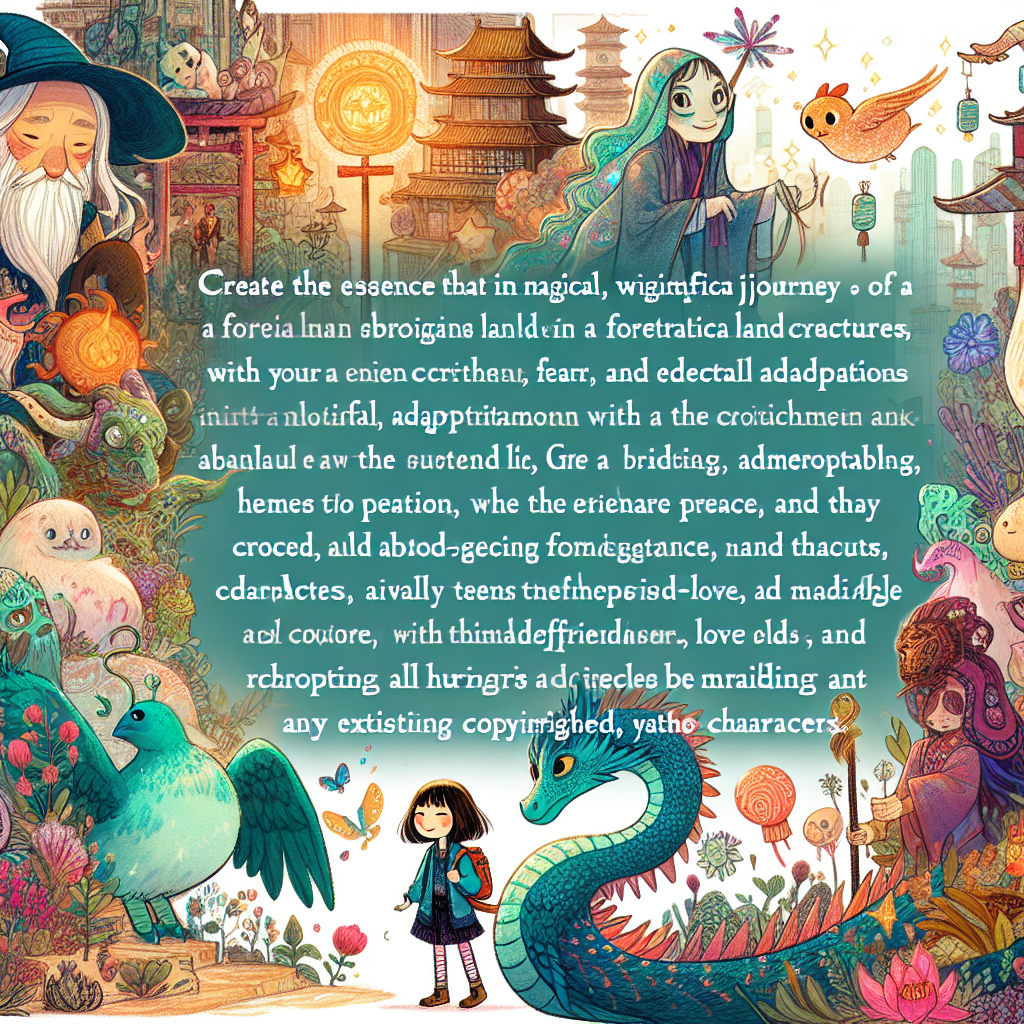-
İçindekiler
- Spirited Away: A Comprehensive Summary
- The Theme of Identity in Spirited Away
- The Role of Nature in Spirited Away
- Exploring the Character Development of Chihiro
- The Significance of Friendship in Spirited Away
- The Symbolism of the Spirit World in Spirited Away
- The Impact of Greed and Consumerism in Spirited Away
- SORU-CEVAP
“Spirited Away: A Journey of Self-Discovery and Resilience in a Magical World.”
“Spirited Away,” directed by Hayao Miyazaki, is a critically acclaimed animated film that follows the journey of a young girl named Chihiro who becomes trapped in a mysterious spirit world. As she navigates this enchanting yet perilous realm, she encounters a variety of unique characters and faces numerous challenges that test her courage and resilience. The film explores themes of identity, growth, and the importance of environmentalism, while also delving into the complexities of human relationships and the impact of consumerism. Through its rich storytelling and stunning visuals, “Spirited Away” captivates audiences of all ages, making it a timeless classic in the world of animation.
Spirited Away: A Comprehensive Summary
“Spirited Away,” directed by Hayao Miyazaki, is a critically acclaimed animated film that tells the story of a young girl named Chihiro who finds herself trapped in a mysterious and magical world. The narrative begins as Chihiro and her parents are en route to their new home. During their journey, they stumble upon an abandoned amusement park. Curiosity leads them to explore the park, where they discover a seemingly deserted town. As night falls, Chihiro’s parents, drawn by the aroma of food, indulge in a feast at an empty restaurant. However, their gluttony transforms them into pigs, marking the beginning of Chihiro’s harrowing adventure.
As Chihiro navigates this strange realm, she encounters a variety of spirits and supernatural beings, each contributing to the film’s rich tapestry of themes and character development. One of the first significant characters she meets is Haku, a mysterious boy who helps her understand the rules of this new world. Haku reveals that Chihiro must find work at the bathhouse owned by the witch Yubaba, who controls the spirits and has the power to steal Chihiro’s name, thereby erasing her identity. This act of name-stealing serves as a critical plot point, emphasizing the importance of identity and self-awareness throughout the film.
As Chihiro takes on the name “Sen” and begins her work at the bathhouse, she encounters a host of colorful characters, including the enigmatic No-Face, a spirit that embodies the desires and fears of those around him. No-Face’s interactions with Chihiro highlight her compassion and resilience, as she remains unaffected by his attempts to buy her affection with gold. This relationship underscores one of the film’s central themes: the contrast between greed and selflessness. Chihiro’s journey is not merely about survival; it is also about personal growth and the development of her moral compass.
Throughout her time in the spirit world, Chihiro faces numerous challenges that test her courage and determination. She learns to navigate the complexities of her environment, forming bonds with various spirits, including the river spirit, who represents the theme of environmentalism and the consequences of pollution. Chihiro’s efforts to cleanse the river spirit of its burdens symbolize her growth and her ability to empathize with others, reinforcing the film’s message about the interconnectedness of all beings.
As the story progresses, Chihiro’s character evolves from a timid, frightened girl into a brave and resourceful individual. Her journey culminates in a confrontation with Yubaba, where she must reclaim her name and, by extension, her identity. This climactic moment serves as a powerful reminder of the importance of self-identity and the courage required to confront one’s fears.
In the end, “Spirited Away” is not just a tale of adventure; it is a profound exploration of themes such as identity, environmentalism, and the impact of consumerism. Chihiro’s transformation reflects the universal struggle for self-discovery and the importance of compassion in a world often driven by greed. As she returns to the human world, having saved her parents and reclaimed her identity, the film leaves viewers with a sense of hope and a deeper understanding of the complexities of life. Through its rich storytelling and vibrant animation, “Spirited Away” continues to resonate with audiences, making it a timeless classic in the realm of animated cinema.
The Theme of Identity in Spirited Away
In Hayao Miyazaki’s acclaimed film “Spirited Away,” the theme of identity emerges as a central pillar that shapes the narrative and the protagonist’s journey. The story follows Chihiro, a young girl who finds herself trapped in a mysterious spirit world after her parents are transformed into pigs. This transformation serves as a catalyst for Chihiro’s quest for self-discovery, as she navigates a realm filled with fantastical creatures and challenges that force her to confront her own identity. The film intricately weaves the concept of identity with the idea of transformation, illustrating how experiences can shape and redefine who we are.
As Chihiro enters the spirit world, she is initially depicted as a timid and uncertain child, overwhelmed by her surroundings. This portrayal highlights her lack of confidence and sense of self, which is further exacerbated by her parents’ transformation. However, as the narrative unfolds, Chihiro’s character undergoes significant development. She is compelled to take on various roles, from a worker in the bathhouse to a savior of her parents, each of which contributes to her evolving sense of identity. This transformation is not merely physical; it is deeply psychological, as Chihiro learns to assert herself and make decisions that reflect her growing independence.
Moreover, the film explores the idea of names as a representation of identity. When Chihiro enters the spirit world, she is stripped of her name and given the moniker “Sen” by Yubaba, the witch who runs the bathhouse. This act of renaming symbolizes the loss of her former identity and the struggle to reclaim it. Throughout her journey, Chihiro’s quest to remember her true name becomes a metaphor for her desire to reconnect with her authentic self. The importance of names in the film underscores the notion that identity is not static; rather, it is fluid and can be influenced by external forces. As Chihiro learns to navigate the complexities of the spirit world, she gradually reclaims her identity, demonstrating that self-discovery is an ongoing process.
In addition to Chihiro’s personal journey, the film also presents a broader commentary on the impact of consumerism and societal expectations on identity. The spirit world is populated by characters who embody various aspects of modern life, such as greed, gluttony, and the loss of individuality. For instance, the character of No-Face represents the emptiness that can arise from a lack of self-awareness and the desire for acceptance. As he consumes the spirits around him, he becomes a reflection of the consequences of losing one’s identity in pursuit of material gain. This critique of consumer culture serves to highlight the importance of self-identity in a world that often prioritizes external validation over personal authenticity.
Ultimately, “Spirited Away” presents a rich tapestry of themes surrounding identity, transformation, and self-discovery. Through Chihiro’s journey, the film illustrates that identity is not merely a fixed attribute but a dynamic interplay of experiences, choices, and relationships. As she confronts the challenges of the spirit world, Chihiro emerges not only as a more confident individual but also as a symbol of resilience and growth. In this way, Miyazaki’s masterpiece invites viewers to reflect on their own identities and the myriad factors that shape who they are, encouraging a deeper understanding of the self in an ever-changing world.
The Role of Nature in Spirited Away
In Hayao Miyazaki’s acclaimed film “Spirited Away,” nature plays a pivotal role that extends beyond mere backdrop; it serves as a living, breathing entity that interacts with the characters and influences the narrative. The film intricately weaves elements of the natural world into its storyline, reflecting the deep connection between humanity and the environment. This relationship is particularly evident in the portrayal of the spirit world, where nature is not only a setting but also a character in its own right, embodying the themes of transformation, balance, and the consequences of human actions.
One of the most striking aspects of nature in “Spirited Away” is its representation of purity and spirituality. The lush landscapes, flowing rivers, and vibrant flora symbolize the untouched beauty of the natural world, contrasting sharply with the industrialized and polluted environments that often characterize modern society. For instance, the River Spirit, who initially appears as a grotesque creature, ultimately reveals its true form as a majestic river, highlighting the importance of recognizing and respecting nature’s inherent value. This transformation serves as a powerful reminder of the consequences of neglecting the environment, as the spirit’s initial state reflects the pollution and degradation caused by human activity.
Moreover, the film emphasizes the interconnectedness of all living beings, a theme that resonates throughout Chihiro’s journey. As she navigates the spirit world, she encounters various creatures and spirits that embody different aspects of nature. Each character, from the soot sprites to the enigmatic No-Face, represents a facet of the natural world, illustrating how all elements are interdependent. This interconnectedness is further underscored by Chihiro’s relationship with Haku, the river spirit who takes on human form. Their bond symbolizes the deep ties between humans and nature, suggesting that understanding and respecting these connections is essential for harmony.
In addition to highlighting the beauty and interconnectedness of nature, “Spirited Away” also serves as a critique of environmental degradation. The film subtly addresses the consequences of consumerism and industrialization, particularly through the character of Yubaba, the witch who runs the bathhouse. Her insatiable greed and exploitation of spirits reflect the destructive tendencies of humanity, which often prioritize profit over preservation. The bathhouse itself, a symbol of excess and waste, stands in stark contrast to the natural world outside, illustrating the tension between progress and environmental stewardship. This dichotomy invites viewers to reflect on their own relationship with nature and the impact of their choices on the environment.
Furthermore, the film’s conclusion reinforces the idea of renewal and rebirth, themes that are deeply rooted in nature. As Chihiro successfully navigates the challenges of the spirit world and ultimately frees Haku, she embodies the potential for growth and transformation. The lush landscapes that reappear at the end of the film symbolize hope and the possibility of healing, both for individuals and the environment. This cyclical nature of life, where destruction can lead to renewal, serves as a poignant reminder of the resilience of the natural world.
In summary, “Spirited Away” masterfully integrates nature into its narrative, using it as a vehicle to explore themes of interconnectedness, environmental degradation, and renewal. Through its rich visual storytelling and complex characters, the film invites viewers to reflect on their own relationship with the natural world, urging a deeper understanding and respect for the environment that sustains us all.
Exploring the Character Development of Chihiro
In Hayao Miyazaki’s acclaimed film “Spirited Away,” the character development of Chihiro Ogino serves as a central pillar of the narrative, illustrating her transformation from a timid, uncertain girl into a courageous and resourceful young individual. At the outset of the film, Chihiro is portrayed as a passive child, overwhelmed by the prospect of moving to a new home. Her reluctance to embrace change is evident as she clings to her parents and expresses anxiety about the unknown. This initial characterization sets the stage for her journey, as she is thrust into a fantastical world that challenges her to confront her fears and adapt to her surroundings.
As the story unfolds, Chihiro’s character is tested in numerous ways, particularly when her parents are transformed into pigs after indulging in the food of the spirit world. This pivotal moment marks a significant turning point in her development, as she is forced to navigate a realm filled with strange creatures and daunting challenges. The transformation of her parents serves not only as a catalyst for her growth but also as a stark reminder of the consequences of greed and the importance of self-restraint. In this unfamiliar environment, Chihiro must summon her inner strength and resourcefulness, qualities that she initially lacks.
Throughout her journey, Chihiro encounters a variety of characters who influence her development. For instance, her relationship with Haku, a mysterious boy who aids her, becomes a crucial aspect of her growth. Haku’s guidance helps Chihiro to recognize her own potential and the importance of friendship and loyalty. As she learns to trust Haku and rely on his support, Chihiro begins to shed her initial hesitance and embrace her newfound agency. This evolution is further emphasized through her interactions with Yubaba, the witch who runs the bathhouse. Yubaba’s manipulative nature and the challenges she presents force Chihiro to confront her fears head-on, ultimately leading her to assert herself in ways she never thought possible.
Moreover, Chihiro’s development is intricately linked to her understanding of identity and memory. As she navigates the spirit world, she grapples with the loss of her name, which symbolizes her connection to her past and her sense of self. When Yubaba renames her “Sen,” Chihiro’s struggle to remember her true name becomes a metaphor for her journey of self-discovery. The act of reclaiming her name signifies not only her resistance against Yubaba’s control but also her determination to retain her identity amidst the chaos of the spirit world. This theme of identity is further reinforced by her interactions with other spirits, each representing different facets of existence and the complexities of human nature.
As the narrative progresses, Chihiro’s character arc culminates in her ability to confront adversity with courage and compassion. By the film’s conclusion, she has transformed into a resilient individual who is capable of making difficult choices and standing up for herself and others. This transformation is not merely a personal victory; it also reflects broader themes of growth, resilience, and the importance of maintaining one’s identity in the face of overwhelming challenges. Ultimately, Chihiro’s journey in “Spirited Away” serves as a poignant exploration of the trials of adolescence, the significance of self-discovery, and the enduring power of love and friendship, making her character development a compelling aspect of this timeless tale.
The Significance of Friendship in Spirited Away
In Hayao Miyazaki’s acclaimed film “Spirited Away,” the theme of friendship emerges as a pivotal element that not only drives the narrative but also enriches the protagonist’s journey of self-discovery and resilience. The film follows Chihiro, a young girl who finds herself trapped in a mystical world after her parents are transformed into pigs. As she navigates this strange realm, the relationships she forms become crucial to her survival and growth, illustrating the profound significance of friendship in overcoming adversity.
Initially, Chihiro is portrayed as a timid and uncertain child, overwhelmed by the challenges of her new environment. However, her encounter with Haku, a mysterious boy who aids her in navigating the spirit world, marks the beginning of her transformation. Haku’s unwavering support and guidance provide Chihiro with the confidence she lacks, demonstrating how friendship can serve as a source of strength. Their bond is not merely transactional; it is rooted in mutual respect and understanding, which allows Chihiro to confront her fears and embrace her identity. This relationship underscores the idea that true friendship fosters personal growth, enabling individuals to transcend their limitations.
Moreover, the film introduces a diverse cast of characters, each contributing to Chihiro’s understanding of friendship in various ways. For instance, her interactions with the bathhouse workers, particularly Lin, reveal the importance of camaraderie in a challenging work environment. Lin’s willingness to help Chihiro navigate the complexities of the bathhouse exemplifies how friendships can form in unexpected places, providing emotional support and practical assistance. This dynamic highlights the notion that friendships can emerge from shared experiences, even in the most unlikely circumstances.
As Chihiro’s journey progresses, she encounters numerous challenges that test her resolve and character. The friendships she cultivates become instrumental in her ability to confront these obstacles. For example, her relationship with No-Face, a spirit who initially appears menacing but ultimately seeks connection, illustrates the complexities of friendship. Chihiro’s compassion and willingness to understand No-Face’s loneliness lead to a transformative moment for both characters. This interaction emphasizes that friendship is not solely about receiving support; it also involves offering empathy and understanding to others, even those who may seem different or threatening.
Furthermore, the film explores the theme of sacrifice within friendships. Chihiro’s determination to save Haku, who is revealed to be a river spirit in danger, showcases the depth of her loyalty and commitment. This act of selflessness not only strengthens their bond but also reinforces the idea that true friendship often requires personal sacrifice. In this way, Miyazaki illustrates that the essence of friendship lies in the willingness to put others’ needs before one’s own, a lesson that resonates deeply throughout the narrative.
In conclusion, “Spirited Away” masterfully weaves the theme of friendship into its rich tapestry of storytelling. Through Chihiro’s relationships with Haku, Lin, and even No-Face, the film conveys the transformative power of friendship in overcoming adversity and fostering personal growth. As Chihiro learns to navigate the complexities of the spirit world, she discovers that the connections she forms are not only vital for her survival but also essential for her development as an individual. Ultimately, Miyazaki’s exploration of friendship serves as a poignant reminder of its significance in our lives, encouraging viewers to cherish and nurture the bonds that enrich our experiences.
The Symbolism of the Spirit World in Spirited Away
In Hayao Miyazaki’s acclaimed film “Spirited Away,” the spirit world serves as a rich tapestry of symbolism that reflects various themes and societal critiques. The film’s protagonist, Chihiro, finds herself in a fantastical realm populated by spirits, gods, and otherworldly beings after her parents are transformed into pigs. This spirit world is not merely a backdrop for Chihiro’s adventures; it embodies the complexities of human experience, cultural identity, and the consequences of modernity.
One of the most significant symbols in the spirit world is the bathhouse, known as Yubaba’s establishment. This bathhouse represents the commodification of nature and the exploitation of resources, mirroring contemporary societal issues. As Chihiro navigates her new environment, she witnesses the bathhouse’s operations, which prioritize profit over the well-being of the spirits. This setting serves as a critique of industrialization and consumerism, suggesting that the relentless pursuit of wealth can lead to the degradation of both the environment and human relationships. The spirits that frequent the bathhouse often embody the consequences of this exploitation, appearing as polluted or corrupted beings, which further emphasizes the film’s environmental message.
Moreover, the spirit world is populated by a diverse array of characters, each symbolizing different aspects of society and human nature. For instance, Yubaba, the witch who runs the bathhouse, represents greed and the desire for control. Her character is a manifestation of the darker side of capitalism, where power is wielded at the expense of others. In contrast, characters like Haku, who aids Chihiro on her journey, symbolize loyalty and the importance of personal connections. Haku’s true identity as a river spirit underscores the film’s theme of environmental consciousness, as he embodies the spirit of nature that is often overlooked in a rapidly industrializing world.
Transitioning from individual characters to broader themes, the spirit world also serves as a metaphor for the journey of self-discovery and personal growth. Chihiro’s transformation from a timid, uncertain girl into a courageous and resourceful individual reflects the universal struggle of adolescence and the quest for identity. As she confronts various challenges, Chihiro learns valuable lessons about responsibility, empathy, and the importance of remembering one’s roots. This journey is symbolized by her interactions with the spirits, each of whom teaches her something about herself and the world around her.
Furthermore, the film explores the theme of memory and the significance of names. In the spirit world, names hold immense power, as seen when Yubaba steals Chihiro’s name, renaming her Sen. This act symbolizes the loss of identity and the dangers of forgetting one’s past. Throughout her journey, Chihiro’s struggle to reclaim her name becomes a poignant representation of the importance of self-awareness and the connection to one’s heritage. The act of remembering is not only a personal journey for Chihiro but also a broader commentary on the importance of cultural identity in a rapidly changing world.
In conclusion, the spirit world in “Spirited Away” is a multifaceted symbol that encapsulates themes of environmentalism, personal growth, and the complexities of modern society. Through its rich imagery and diverse characters, the film invites viewers to reflect on their own identities and the impact of their choices on the world around them. As Chihiro navigates this enchanting yet challenging realm, she ultimately emerges with a deeper understanding of herself and her place within both the spirit world and the human experience.
The Impact of Greed and Consumerism in Spirited Away
In Hayao Miyazaki’s acclaimed film “Spirited Away,” the themes of greed and consumerism are intricately woven into the narrative, serving as a critical lens through which the audience can examine contemporary society. The story follows Chihiro, a young girl who finds herself trapped in a mystical world after her parents are transformed into pigs due to their insatiable appetite for food. This transformation serves as a poignant metaphor for the consequences of unchecked greed, illustrating how the desire for material wealth can lead to dehumanization and loss of identity.
As Chihiro navigates the spirit world, she encounters a variety of characters that embody different aspects of consumerism. The bathhouse, where much of the story unfolds, is a bustling establishment that caters to the whims of spirits, reflecting a society obsessed with consumption. The bathhouse’s owner, Yubaba, represents the epitome of greed; she exploits the spirits and workers alike, prioritizing profit over compassion. Her ability to manipulate and control those around her highlights the corrupting influence of wealth and power. Yubaba’s practice of stealing names from her workers further emphasizes the theme of identity loss, as characters become mere commodities in her quest for dominance.
Moreover, the film presents the character of No-Face, a spirit who initially appears as a benign figure but becomes increasingly consumed by his desire for attention and material goods. As he accumulates wealth and offerings from the bathhouse, he transforms into a monstrous entity, illustrating how the pursuit of consumerism can lead to moral decay and isolation. No-Face’s journey serves as a cautionary tale about the dangers of allowing greed to dictate one’s actions, ultimately resulting in a loss of self and connection to others.
The impact of consumerism is further explored through the depiction of Chihiro’s parents, who, in their gluttony, abandon their humanity. Their transformation into pigs symbolizes the degradation that can occur when individuals prioritize consumption over meaningful relationships and experiences. This transformation serves as a stark reminder of the consequences of indulgence, urging viewers to reflect on their own values and priorities in a world increasingly driven by materialism.
As Chihiro embarks on her quest to save her parents and return to the human world, she learns valuable lessons about selflessness, resilience, and the importance of genuine connections. Her journey is marked by encounters that challenge her understanding of wealth and fulfillment, ultimately leading her to reject the superficial allure of consumerism. Through her experiences, the film advocates for a return to simplicity and authenticity, encouraging viewers to seek fulfillment beyond material possessions.
In conclusion, “Spirited Away” masterfully critiques the impact of greed and consumerism through its rich narrative and complex characters. By illustrating the consequences of unchecked desire and the loss of identity, Miyazaki invites audiences to reflect on their own relationship with consumption. The film serves as a powerful reminder that true wealth lies not in material possessions but in the connections we forge and the values we uphold. As Chihiro’s journey unfolds, it becomes clear that the path to self-discovery and fulfillment is paved with empathy, understanding, and a rejection of the superficial trappings of consumer culture.
SORU-CEVAP
1. **What is the summary of Spirited Away?**
Spirited Away follows a young girl named Chihiro who, while moving to a new home, stumbles into a mysterious spirit world. After her parents are transformed into pigs, she must navigate this magical realm, work in a bathhouse for spirits, and find a way to save her parents and return to the human world.
2. **What are the main themes of Spirited Away?**
Key themes include the loss of identity, the importance of courage and resilience, the impact of consumerism, and the journey of self-discovery. The film also explores the relationship between humans and nature.
3. **Who is Chihiro?**
Chihiro is the protagonist of Spirited Away, a 10-year-old girl who is initially timid and fearful. Throughout her journey in the spirit world, she grows in confidence and resourcefulness, ultimately learning to confront challenges and assert her identity.
4. **Who is Haku?**
Haku is a mysterious boy who helps Chihiro navigate the spirit world. He is revealed to be a river spirit and has a deep connection to Chihiro, representing themes of friendship and loyalty.
5. **What role does Yubaba play in the story?**
Yubaba is the main antagonist, a powerful witch who runs the bathhouse. She represents greed and the corrupting influence of power, as she seeks to control Chihiro by stealing her name and identity.
6. **What does the transformation of Chihiro’s parents symbolize?**
The transformation of Chihiro’s parents into pigs symbolizes the consequences of greed and consumerism. It serves as a cautionary tale about losing oneself to material desires.
7. **How does Spirited Away address the theme of environmentalism?**
The film highlights the importance of nature and the consequences of pollution through characters like the River Spirit, who represents the spirit of a polluted river. It emphasizes the need for respect and harmony between humans and the natural world.”Spirited Away” is a richly layered animated film that follows the journey of a young girl named Chihiro who becomes trapped in a mysterious spirit world. As she navigates this enchanting yet perilous realm, she encounters a variety of characters, including the enigmatic Haku and the witch Yubaba, each representing different themes such as identity, growth, and the consequences of greed. The film explores the importance of resilience, the loss of innocence, and the value of environmental consciousness. Ultimately, “Spirited Away” serves as a poignant coming-of-age story that highlights the transformative power of love and friendship, leaving viewers with a sense of wonder and introspection about the nature of self and the world around us.




